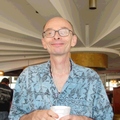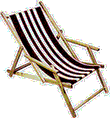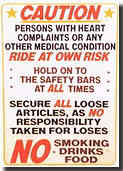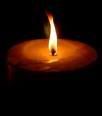Wednesday, September 05, 2012
John Cage, born September 5, 1912
(Still in process of writing this post)
Unless you cling to narrow, obsolete ideas on music, John Cage doesn't so much challenge what you believe about music as confirm what you already suspected. Music can be what you perceive as music. It's absurd to make a distinction between noise & music; for a start you'll never get everyone to agree on where you draw the line. There is no such thing as silence; something is always making a sound (probably his most well-known quote). You can do whatever you want. For many people in music the scariest thing about John Cage was that he always seemed to be having fun. The latter was no problem for me. I came from rock music, & when playing in a rock band stopped being fun, I stopped playing in a rock band. I grasped & loved John Cage's spirit almost immediately. It was the implications of what Cage was saying about the nature of music, & art itself, that challenged me. It was like staring into an abyss where "composing" music, being a composer, or any kind of artist, were no longer necessary. For the first few years of our relationship, my then artist girlfriend & I discussed Cage's ideas for hours on end with each other & with friends, far into the nights, as we worked out the kinds of artists we wanted to be & the audiences we wanted to reach, This even as I was being mentored by a more-or-less traditional poet who had himself gone to an experimental college, Black Mountain, & had learned from an artist/theoretician, Mary Caroline Richards, whose ideas closely corresponded with Cage's. All that deep aesthetic thinkin' slowly dissipated. Composer Charles Ives had proposed in the early 20th Century pretty much what John Cage was saying. John Cage had kept on composing, although it was all "indeterminate" music, his choice. I'd seen a great Marcel Duchamp retrospective in Philadelphia that put the matter in historical perspective. I was hearing sounds better. I realized childhood nostalgia wasn't the only thing generating my love of Jersey boardwalks.
By the end of the Seventies I'd concluded there was more than enough published poetry in the world, but never enough poets. I joined WFMU & loved the transitory, impermanent nature of radio even more than I did the printed page. (When WFMU began archiving entire programs online, I became less interested in doing occasional radio shows. When individual song links were added, which undermined the idea of a "free form" radio show as some kind of complete artifact, like a painting or sculpture, I was more comfortable). I decided that whatever I did, I'd just consider it something I did as a poet, because I needed somewhere to hang my coat that wouldn't confuse people, or myself.
But Cage also unleashed some anger in me at other poets, particularly in Jersey, because they would only deal with that piece of what I did, & I knew it would never get 100% of my attention & loyalty. Only a few grasped it was part of a broader package & maybe they ought to check out the rest of it (I always had a handful of comprehending allies, here & out-of-state, & other WFMU DJs didn't need you to explain anything).
But it was John Cage's writing that had the most positive impact on me, & his influence has increased over the years, although I rarely go back to any of his writing. I was intrigued by how Cage formally organized his writing, & by how he organized it into collections. I'd been intrigued since childhood by the idea one could subject writing to an outside formal arrangement, even a visual one, that had no connection with the writing's grammatical structure or meaning. I remember exactly what make me think about this, although not so clearly:
Don't say
milk say
Bren nan's
Those words were on the side of a milk carton, with the carton seam running between each pair of words, so the comma between milk & say was hidden, if there was a comma there at all. Brennan's was divided into syllables. One could make a radio jingle of the motto, but here it lays flat, deadpan. I was probably about 12 or 13. But I had already become interested in poetic forms just as forms. Later, although I didn't do it much myself, I still had a soft spot for the obsessive syllable-counters like Marianne Moore.
John Cage was one of the greatest experimental visual & "sound" poets of the 20th Century. Without Cage there's no Yoko Ono.
"If a nation expects to be ignorant and free, in a state of civilization, it expects what never was and never will be." Thomas Jefferson
Unless you cling to narrow, obsolete ideas on music, John Cage doesn't so much challenge what you believe about music as confirm what you already suspected. Music can be what you perceive as music. It's absurd to make a distinction between noise & music; for a start you'll never get everyone to agree on where you draw the line. There is no such thing as silence; something is always making a sound (probably his most well-known quote). You can do whatever you want. For many people in music the scariest thing about John Cage was that he always seemed to be having fun. The latter was no problem for me. I came from rock music, & when playing in a rock band stopped being fun, I stopped playing in a rock band. I grasped & loved John Cage's spirit almost immediately. It was the implications of what Cage was saying about the nature of music, & art itself, that challenged me. It was like staring into an abyss where "composing" music, being a composer, or any kind of artist, were no longer necessary. For the first few years of our relationship, my then artist girlfriend & I discussed Cage's ideas for hours on end with each other & with friends, far into the nights, as we worked out the kinds of artists we wanted to be & the audiences we wanted to reach, This even as I was being mentored by a more-or-less traditional poet who had himself gone to an experimental college, Black Mountain, & had learned from an artist/theoretician, Mary Caroline Richards, whose ideas closely corresponded with Cage's. All that deep aesthetic thinkin' slowly dissipated. Composer Charles Ives had proposed in the early 20th Century pretty much what John Cage was saying. John Cage had kept on composing, although it was all "indeterminate" music, his choice. I'd seen a great Marcel Duchamp retrospective in Philadelphia that put the matter in historical perspective. I was hearing sounds better. I realized childhood nostalgia wasn't the only thing generating my love of Jersey boardwalks.
By the end of the Seventies I'd concluded there was more than enough published poetry in the world, but never enough poets. I joined WFMU & loved the transitory, impermanent nature of radio even more than I did the printed page. (When WFMU began archiving entire programs online, I became less interested in doing occasional radio shows. When individual song links were added, which undermined the idea of a "free form" radio show as some kind of complete artifact, like a painting or sculpture, I was more comfortable). I decided that whatever I did, I'd just consider it something I did as a poet, because I needed somewhere to hang my coat that wouldn't confuse people, or myself.
But Cage also unleashed some anger in me at other poets, particularly in Jersey, because they would only deal with that piece of what I did, & I knew it would never get 100% of my attention & loyalty. Only a few grasped it was part of a broader package & maybe they ought to check out the rest of it (I always had a handful of comprehending allies, here & out-of-state, & other WFMU DJs didn't need you to explain anything).
But it was John Cage's writing that had the most positive impact on me, & his influence has increased over the years, although I rarely go back to any of his writing. I was intrigued by how Cage formally organized his writing, & by how he organized it into collections. I'd been intrigued since childhood by the idea one could subject writing to an outside formal arrangement, even a visual one, that had no connection with the writing's grammatical structure or meaning. I remember exactly what make me think about this, although not so clearly:
Don't say
milk say
Bren nan's
Those words were on the side of a milk carton, with the carton seam running between each pair of words, so the comma between milk & say was hidden, if there was a comma there at all. Brennan's was divided into syllables. One could make a radio jingle of the motto, but here it lays flat, deadpan. I was probably about 12 or 13. But I had already become interested in poetic forms just as forms. Later, although I didn't do it much myself, I still had a soft spot for the obsessive syllable-counters like Marianne Moore.
John Cage was one of the greatest experimental visual & "sound" poets of the 20th Century. Without Cage there's no Yoko Ono.














